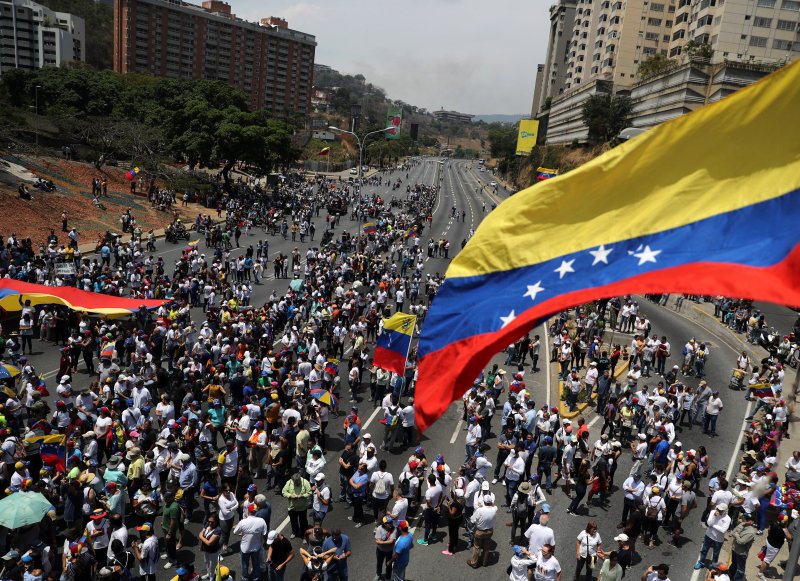The United Nations documented President Nicolás Maduro’s regime continues to detain political opponents despite agreeing in 2023 to hold free and fair elections. File Photo by Miguel Gutiérrez/EPA-EFE
July 5 (UPI) — Today is Venezuelan Independence Day, less than a month out from the country’s highly anticipated general election on July 28 when many opposition supporters expect to unseat President Nicolás Maduro.
Leading the opposition is Edmundo González Urrutia, an unassuming, soft-spoken former diplomat who was catapulted into the political spotlight in April after opposition frontrunner María Corina Machado and her first substitute Corina Yoris were barred from running against Maduro.
González, with the popular Machado backing him, now is leading in the polls with many citizens believing the political newcomer could prevent Maduro from winning a sixth term at the helm of the beleaguered South American nation.
Machado’s removal from the ticket follows an alarming pattern the Maduro regime has taken in dealing with political opponents.
Maduro, who has held onto power since 2013, is presiding over a country in political and economic turmoil. The sitting administration has cracked down fiercely on anti-Maduro demonstrations and detained and even kidnapped political opponents, according to the U.S. State Department.
Due to Maduro’s track record of harsh dealings with political dissent, the United Nations’ High Commissioner for Human Rights Volker Türk warned it is likely that his administration would interfere in the upcoming election.
“My office continues to receive reports of detentions as election day approaches, including of supporters and members of the opposition. This does not augur well, and I urge a change to such practices,” Türk said, noting his office has documented at least 28 cases of arbitrary detention in the past year.
“This occurred for periods ranging from two to 41 days, thus amounting to enforced disappearance. All allegations of enforced disappearances must be investigated and prosecuted, and the practice must end.”
Venezuela’s ambassador to the U.N. Alexander Gabriel Yanez Deleuze rebuked Türk’s characterization of the Maduro government and instead blamed “foreign and domestic” entities for undermining the stability “that has been won thanks to the leadership of President Nicolas Maduro.”
“The high commissioner, the Venezuelan opposition, however, are calling out a fraud and are calling for violence because they do not accept the Bolivarian revolution,” he said, noting the election will have 17 different auditors to oversee the counting of votes.
The Carter Center, a nonprofit established by former President Jimmy Carter and First Lady Rosalynn Carter, said it plans to deploy an election observation mission to Venezuela ahead of the election.
The center was invited to observe the election by Venezuela’s National Electoral Council pursuant of the Barbados Agreement, which Maduro and opposition party leaders signed in October 2023 as a roadmap to hold a free and fair election in 2024.
The United States in January reimposed some economic sanctions against Venezuela due to Maduro’s continuing arrest of political adversaries.
The State Department in 2019 withdrew all diplomatic personnel from U.S. Embassy Caracas and suspended operations.
The U.N. International Organization for Migration estimated the political and economic instability in Venezuela has caused more than 6 million migrants to flee, and 17 South American countries host about 80% of them.
While many nearby nations have welcomed these undocumented refugees and provided them with health care, education and employment, the United States earlier this week agreed to help Panama deport “irregular migrants” who are coming into the country through the Darien Province from South America.
The Department of Homeland Security estimated about 520,000 “irregular migrants” traveled through Darien Province last year.

